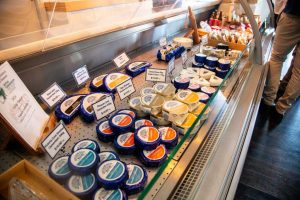
Key points:
- A vital plastics recycling company goes bust despite securing millions in government grants
- The former managing director says Envorinex had “proved the concept” but “COVID and everything else was against us”
- Tasmanians who used the company’s services are now searching for an alternatives
The plastics recycling company became a poster child for the “circular economy” as it helped transform old farming, fishing and mining equipment into new products.
It was popular among politicians keen to champion sustainability without sidelining industry; it even attracted millions in government grants.
But amid the turmoil of the pandemic, the company went bust — and those who wanted it to solve their waste woes were left with piles of plastic.
The perils of a start-up success story
Envorinex emerged from the ashes of a defunct plastics fabrication company in 2009 in the industrial northern Tasmanian region of George Town.
It gained a reputation among dairy farmers for offering a free collection service for silage wrap, the plastic sheeting that protects bales of feed.
One in six Tasmanian dairy farmers registered for the scheme in 2015, but now many have “a mountain of silage wrap growing”, Tasmanian Farmers and Graziers Association president Ian Sauer said.
“The farmers are in a dilemma because there’s nowhere to put it,” he said.
“It’s not really environmentally friendly, burning it, and certainly not environmentally friendly, burying it.”
The silage scheme ran into trouble a few years before Envorinex was placed into liquation in April this year.

Former managing director Jenny Brown said the processing machine, which came from China, suffered repeated mechanical failures but the manufacturer couldn’t send anyone to fix it because of COVID lockdowns.
“And they wouldn’t let us use local engineers,” she said.
Dairy farmer Stuart Burr uses around 700 bales of silage a year and is dismayed there’s nowhere to send the wrapper but landfill.
“Most of the guys I talked to, they want to look after the land,” he said.
“But the outcome at the moment for silage wrap is a long way from ideal.”
$3m in taxpayer grants before demise
Silage was only one aspect of Envorinex’s recycling repertoire and Ms Brown blamed the businesses’s downfall on freight issues during the pandemic.
Cashflow collapsed as they struggled to send recycled plastic material to customers in China and Vietnam.
“Anything that was food-based, wine-based, that was coming out of Tasmania was getting first preference on the ships,” Ms Brown said.
“In early April, we tried to book six containers. We could only get two and we couldn’t have them until the end of June.”
The company hit these headwinds just after securing a $2.1 million grant from the former Coalition government’s Recycling Modernisation Fund to help them expand and process an additional 6,000 tonnes of plastic.
The Tasmanian government agreed to co-fund the grant and paid out $839,976.
A spokesperson said they are now working with the liquidators and “considering opportunities to support businesses to fill the gap that has been left”.
Ms Brown said they hadn’t received any funds from another $1.3 million grant offered by the Queensland government to build a new plant in Toowoomba.
“With grants, you always have to spend the money and then claim it back,” he said.
Aquaculture companies deal with marine debris
The loss of a dedicated plastics recycling facility has also hit the aquaculture sector, which is keen to highlight its environmental credentials as it struggles to shake years of negative press.
Tasmanian east coast oyster farmer Dan Roden was trying to recycle around 40,000 plastic baskets but it proved beyond Envorinex’s capabilities because of challenges separating different types of plastic.
After years of storing thousands of oyster basket at his depot, Mr Roden decided he had no option but to break them up and send it to landfill.

Mr Roden has now switched to a different type of basket that’s easier to recycle.
“We’re the stewards of the waterway out there … we’re trying to make sure that we look after the environment as much as we can,” he said.
“It’s sort of frustrating when the technology is there, but we don’t have that infrastructure here available.”

New ventures try to fill plastics void
Some salmon farmers are now turning to companies such as Mitchell Plastics Welding, which secured $3 million from the Recycling Modernisation Fund to set up a new processing plant.
Operations manager for recycling and manufacturing, John Meehan, was confident the venture would work because they would manufacture products in Tasmania rather than relying on exports.
“There are a lot of other products that we will be able to make like pallets and wheelie bins. It’s going to be quite exciting what we can produce locally,” he said.

Dairy Australia is also developing a national silage recycling scheme and project leader Ian Olmstead hoped a large trial would be operating by next financial year.
“The really tricky part of it is how do you fund it, how do you make it cost effective for farmers and everyone in the supply chain?” he said.
“And we just have a lack of enabling infrastructure in Australia.”
But Mr Olmstead doubts whether another silage recycling facility will be viable in Tasmania.
“That’s quite disappointing for farmers in Tasmania. But I know Jenny and the team did everything they could,” he said.

Ms Brown now lives interstate and said having to close the business she had built was “the worst few months of my life”.
“That was probably the hardest decision because we knew we were going to be letting down a lot of people,” she said.
She said Envorinex had “proved the concept” but “COVID and everything else was against us”.
“Plastics, it has a place in the marketplace,” she said.
“Done properly, it can be recycled, it can become a closed loop system. It’s the public that have to help the manufacturers and the designers of products to make sure it can be recycled.”




















